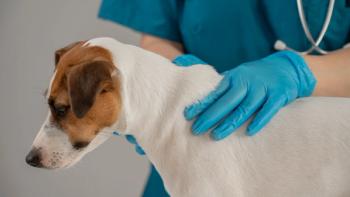
Otitis externa management: You could be doing it wrong
From "that smell" to potential ear hematomas and ablations, otitis externa can be a clinical challenge for any veterinary practitioner to manage. Wayne Rosenkrantz, DVM, DACVD, answers some of the most common questions about his approach to the management of this odorous condition.
Getty ImagesQ. To clean or not to clean ears in the clinic?
A. Cleaning ears is important, and most cases of otitis externa require some degree of ear cleaning or flushing before therapy. Excess debris and purulent material left in the ear prior to therapy can reduce the efficacy of your therapy. In addition, without cleaning you often are unable to perform a complete examination of the ear canal.
Q. What if you just can't see that tympanic membrane?
A. If the tympanic membrane cannot be visualized, then perform further cleaning and flushing. Most optimally, this should be done under sedation or anesthesia and may require a combination of tube flushing, ear loops and video otoscopy. If the tympanic membrane is documented to be ruptured or you suspect it is ruptured, this can influence the type of therapy that is applied into the ear canal. Certain cleansers and antimicrobials are more contraindicated when the tympanic membrane is ruptured and more likely to create an ototoxic reaction.
Q. Should we do culture and sensitivity testing on newly diagnosed cases?
A. I do not perform a culture and sensitivity in every case of otitis externa. I start with my otoscopic and cytologic examinations and my review of the history of medications previously used to base my decision on whether culture and sensitivity testing is indicated.
Culture and sensitivity testing does not always isolate the entire bacterial population or yield accurate sensitivity testing depending on the site or level in the ear from where the sample was taken. When I do take samples, I like to put a small amount of sterile saline solution in the ear, massage the canal, aspirate a small amount of the fluid out, and then use this fluid to do my culture and sensitivity testing.
Q. What are you finding are the most common pathogens causing infection in otitis externa cases these days?
A. The most common pathogens in dogs include yeasts (Malassezia species) and bacteria (Staphylococcus, Pseudomonas, Escherichia and Proteus species).
Q. What do you experience as the biggest obstacle for successful outcome of treating otitis externa?
A. Controlling the underlying primary cause for the otitis. If you identify and control the primary disease, then success is more common. Early identification and control of infection and underlying disease is critical to avoid more chronic proliferative changes.
Another important issue is owner compliance and getting clients to properly treat and medicate the ears.
Q. What are some common underlying causes of chronic otitis externa?
A. Both atopic dermatitis and adverse food reactions are common primary diseases for otitis externa. After looking at the history and physical examination findings, I may pursue one of these diseases more than the other. For example, adverse food reaction cases are more commonly year-round and may also have a concurrent history of gastrointestinal abnormalities.
Q. How important do you think it is to caution owners about the possibility of recurrence of otitis externa?
A. It is extremely important. This is particularly true when you are dealing with underlying primary diseases that are not well-controlled. Without proper control and management of the underlying disease, recurrences are highly likely. In clinical practice this is most commonly due to poorly controlled atopic dermatitis or adverse food reaction cases.
Wayne Rosenkrantz, DVM, DACVD, is a veterinary dermatologist at Animal Dermatology Clinic in Tustin, California.
Newsletter
From exam room tips to practice management insights, get trusted veterinary news delivered straight to your inbox—subscribe to dvm360.




